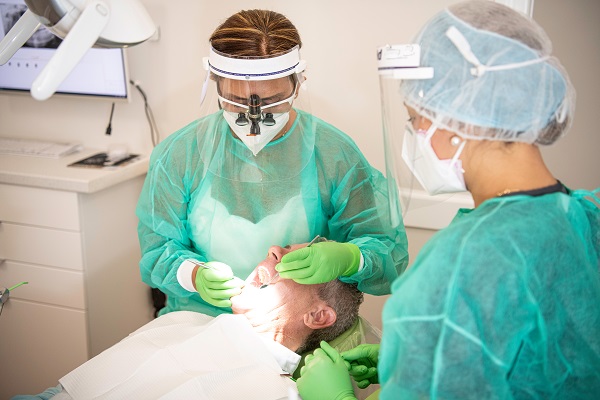The Different Types of Oral Surgery Procedures

Looking for information on oral surgery? If you are currently in need of a simple surgical procedure in order to improve your dental health, then learning more about the different types of oral surgery procedures that dentists can perform is a great idea.
General dentists and oral surgery
Understanding more about oral surgery is a great idea, as there are different types of dental professionals who can perform oral surgical procedures. General dentists are your primary dental-care providers. They are the first person to contact when you are in need of any dental-related care, as they diagnose, treat and manage their patients' overall dental care needs. A few examples of procedures general dentists perform include examinations and cleanings, placing crowns and implants and performing simple oral surgery procedures, such as extracting a wisdom tooth.
Different types of oral surgery procedures
The list below includes some of the more common types of simple oral surgery procedures, which can be performed by a general dentist.
Dental implants
Many dental patients who are missing one or more of their teeth and therefore need to choose a tooth-replacement option are choosing dental implants for this purpose. They want to experience the many benefits that implants offer, including their ability to look and act just like a real tooth. The reason why implants are able to closely resemble a natural tooth is that it is surgically inserted into a patient's jawbone, allowing it to fuse with the gum tissue and jawbone.
Wisdom tooth extraction
The extraction of wisdom teeth is necessary when they begin to grow in and cause problems to the rest of the teeth. While many dental patients can accommodate this third set of molars without experiencing any problems, some patients will experience problems such as impacted or crooked teeth. Any patient who is experiencing wisdom teeth problems needs to make an appointment with a general dentist as soon as possible for a proper diagnosis.
Root canals
When tooth decay enters the pulp of a tooth, it means that the tooth is infected and a root canal needs to be performed in order to save the tooth. It is always recommended to save a tooth, as once a dental patient loses one of their teeth, they need to find a tooth-replacement option as soon as possible in order to have a healthy mouth. The root canal procedure is one that requires a general dentist to remove the nerve and the infected pulp, thoroughly clean the area and then seal the tooth so it can once again function normally.
Do you currently need oral surgery?
Many dental patients who either think or know that they are in need of an oral surgical procedure take the time to learn more about what they can expect, as this helps them to better prepare. If you would like to make a consultation appointment with us for more information, simply contact us today so we can get you scheduled.
Request an appointment here: https://dentalstudiocolleyville.com or call Dental Studio Colleyville at (817) 885-5188 for an appointment in our Colleyville office.
Check out what others are saying about our dental services on Yelp: Oral Surgery in Colleyville, TX.
Recent Posts
Oral surgery is sometimes necessary to correct issues that are beyond treatment from basic restorative or preventive care. A general dentist trained in oral surgery can often provide a variety of in-office procedures, offering both convenience and continuity of care. These treatments are performed in a comfortable setting, and they support long-term oral health, improve…
Oral surgery is a branch of dental care that offers a wide range of procedures designed to address conditions and issues affecting the mouth, teeth, and jaw. These procedures can help maintain oral health and address complex dental problems. Understanding the different approaches to oral surgery can help patients make informed decisions about their treatment…
Oral surgery is an invasive procedure. A dentist will recommend this procedure if the damage is severe and correction must happen right away. This surgery may be an aggressive solution to a dental issue, but your dentist will not suggest it unless your comfort or health relies on it. If you want to know why…
The idea of oral surgery can be intimidating, especially when your dentist recommends it. It is easy to understand the extra layer of anxiety that happens when the dentist goes on to refer you to a specialist.As you picture an unfamiliar person coming at your mouth with sharp instruments, you ask yourself: Do you really…


